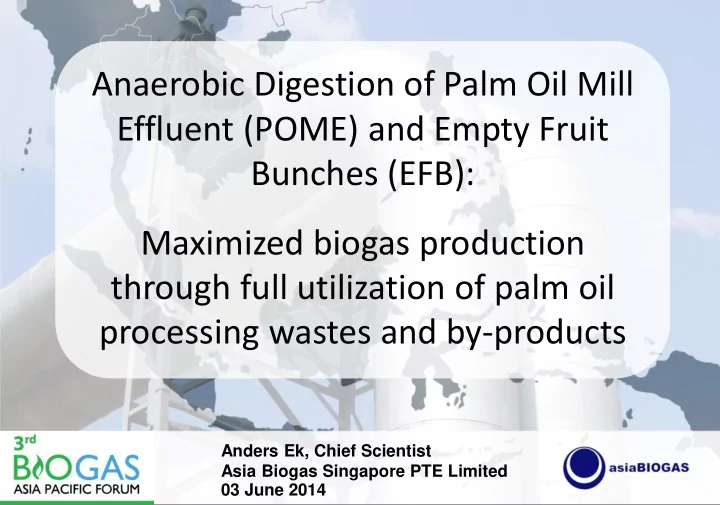

Anaerobic Digestion of Palm Oil Mill Effluent (POME) and Empty Fruit Bunches (EFB): Maximized biogas production through full utilization of palm oil processing wastes and by-products Anders Ek, Chief Scientist 1 Asia Biogas Singapore PTE Limited 03 June 2014
ASIA BIOGAS INTRODUCTION 2
Company Introduction • Offices in Singapore, Bangkok and Jakarta • Design/Engineering, Turn-key supply , O&M Services and Project Development o Industrial heat o Power generation o Compressed Biogas/Biomethane (CBG/bioCNG) • Over 80 projects in Thailand, Philippines and Vietnam • 6 operating projects in Thailand (BOOT) • Under construction: o Krabi 2.2 MW POME, Thailand o Greenfields Dairy Farm Biogas, Indonesia 3
LARGE PLANTS? 4
Starch Wastewater Biogas Plant, KWTE 10,000 m3 6 WW/day 3 MW Power 1 Plant and 2 22 MW(thermal ) 5 4 1) Mixing Tank 2) Pump House 3 3) ABR 4) Control Room 5) Blower House 6) Power Plant
Cassava Pulp (garg) Biogas Plant, SWE 7 1,500 ton garg/day 8.4 MW Power 6 plant and 15 MW(thermal) 3 1) Pulp Dilution 5 2) Mixing Tanks 4 3) ABRs 1 4) Blower/Pump 3 House 2 5) Control Room 6) Power House 7) Flares
Biogas plants at SWI, Thailand 1 1) Starch Factory 2) Starch Wastewater Biogas Plant 3 3) Cassava Pulp (garg) Biogas 2 Plant 11.4 MW Power Plant and 37 MW(thermal)
WASTES FROM PALM OIL PRODUCTION – BIOGAS AND POWER POTENTIAL 8
Wastes from Palm Oil Production POME 0.5 – 0.6 m3/ton FFB COD: 50 – 100,000 mg/L EFB 22 – 24 % of FFB 35 % TS 90 % VS of TS Decanter cake 4 % of FFB 20 – 25 % TS 80 – 85 % VS of TS 9
45 TPH POM Waste 5.3 (8.2)* MW FFB Methane POME 45 TPH 602 m3/h 540 m3/day COD: 90,000 mg/L Power 2.46 MW EFB Methane 248 ton/day 652 (1304)* m3/h 35 % TS Power 90 % VS of TS 2.67 (5.33)* MW Decanter cake Methane 43 ton/day 100 m3/h 23 % TS Power 83 % VS of TS 0.4 MW 10 *) with pretreatment of EFB
BIOGAS PRODUCTION FROM POME 11
Biogas production from POME • Technology options? IN-GROUND REACTOR TANK REACTOR Reactor type Anaerobic Baffled Reactor Continuous Stirred Tank (ABR) Reactor (CSTR) Area Large Medium Technology Simple Medium Automation Medium High Investment Lower Higher 12
KrabiWTE POME 2.2 MW • Krabi Waste to Energy Co Ltd • Host: Krabi Oil-Palm Farmers Cooperatives Federation Ltd Parameter Unit Data POME flow m3/day 500 POME COD mg/L 100,000 Methane Nm3 CH4/day 14,875 Biogas Nm3/day 24,792 Power equivalent kWe 2,534 13
KrabiWTE POME 2.2 MW (May) 15
Biogas production from POME • Effluent treatment? • Zero-discharge? • Technology no issue – produce drinking water if you want! (RO, Vibrating Membrane Filtration, etc) • Cost/profitability is the issue! 16
Biogas production from POME • Aerobic lagoons/irrigation – low cost • Aerated treatment OK – but consider OPEX! • Solids capture with geo-membranes Parameter Before After % Removal COD (mg/L) 44,000 221 99.5 % TSS (mg/L) 44,500 400 99.1 % No polymer added! 17
BIOGAS PRODUCTION FROM EFB 18
Energy production from EFB • Sustainable? Structure Energy Nutrients material to soil Return to No Yes Yes plantation Composting No Yes Yes Incineration Yes No? No Pellet Yes, indirect No No production Biogas Yes Yes Yes 19
Empty Fruit Bunches • 35 % TS • 90 % VS of TS • Cellulose: 29 – 39 % (d.b.) (cassava pulp: 13%) • Hemicellulose: 22 % (d.b) • Lignin 23% (d.b.) (cassava pulp: < 2% !) 20
EFB – Structure? (Doherty et al., 2010) (Mosier et al., 2004) 22
Biogas production from EFB • Challenges? • Low Nitrogen • Oil-recovery yes/no Methane yields • High TS High-solids digestion • Ligno-cellulosic Pre-treatment economic? 23
Extruded EFB? 5 mm 24
Biogas production from EFB PRETREATMENT (OPTIONAL) EFB PRESS (OPTIONAL) SIZE-REDUCTION OIL-RECOVERY POWER CBG OIL GAS PROCESSING SOLID FERTILIZER POME DIGESTATE LIQUID FOR DIGESTION DEWATERING AFTER IRRIGATION 26 AD
SYNERGIES / CONCLUSIONS 28
Synergies POME/EFB • C/N ratio EFB not optimal – N from POME AD effluent • Common gas train – H2S scrubber – Dehumidifying – Gensets – CAPEX/OPEX reductions 29
Biogas from POME & EFB • Conclusions? – Energy + Nutrients + Structure material to soil • Power output POME & EFB to biogas @ 90,000 mg COD/L Mill size Power @ Different pre-treatment ton FFB/hour Min Max 45 5.5 MW 8.2 MW 60 7.4 MW 11 MW 90 11 MW 16 MW 120 15 MW 22 MW 30
Biogas Design Biogas solutions for: Engineering Services Cassava Starch EPC and Turnkey Palm Oil Project Construction Manure Energy Crops Project Financing Agro-industrial Wastes Solutions Food/Beverage Ethanol Anders Ek, Chief Scientist asiaBIOGAS Bangkok – Singapore – Jakarta www.asiabiogas.com 31 anders.ek@asiabiogas.com
Recommend
More recommend